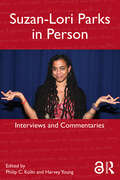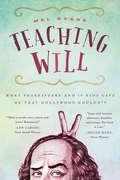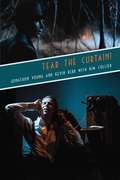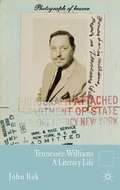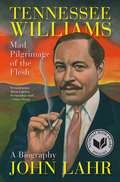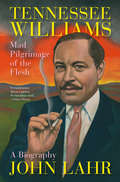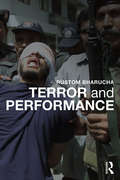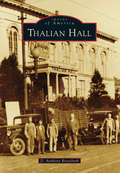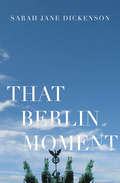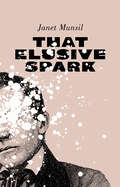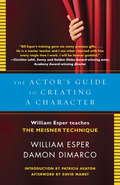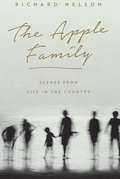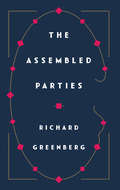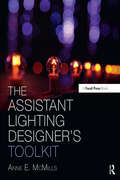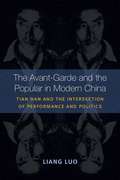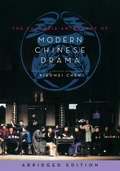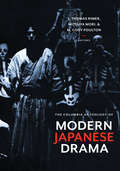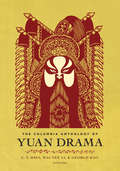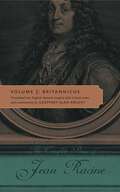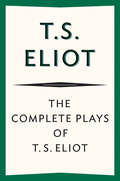- Table View
- List View
Suzan-Lori Parks in Person: Interviews and Commentaries
by Philip C. Kolin Harvey YoungThis collection of interviews offers unprecedented insight into the plays and creative works of Suzan-Lori Parks, as well as being an important commentary on contemporary theater and playwriting, from jazz and opera to politics and cultural memory. Suzan-Lori Parks in Person contains 18 interviews, some previously untranscribed or specially undertaken for this book, plus commentaries on her work by major directors and critics, including Liz Diamond, Richard Foreman, Bonnie Metzgar and Beth Schachter. These contributions combine to honor the first African American woman to receive the Pulitzer Prize in drama, and explore her ideas about theater, history, race, and gender. Material from a wide range of sources chronologically charts Parks’s career from the 1990s to the present. This is a major collection with immediate relevance to students of American/African-American theater, literature and culture. Parks’s engaging voice is brought to the fore, making the book essential for undergraduates as well as scholars.
Teaching Will: What Shakespeare and 10 Kids Gave Me that Hollywood Couldn't
by Mel RyaneWhat happens when an idealist volunteers to introduce Shakespeare to a group of unruly kids? Bedlam. Tears. And hard lessons learned. Convinced that children can relate to Shakespeare's themes--power, revenge, love--Mel Ryane launches The Shakespeare Club at a public school. Teaching Will is a riotous cautionary tale of high hopes and goodwill crashing into the realities of classroom chaos. Every week Mel encounters unexpected comedy and drama as she and the children struggle toward staging a production of A Midsummer Night's Dream. Woven through this fish-out-of-water tale is Mel's own story of her childhood aspirations, her acting identity, and the heartbreaking end of her onstage career. In the schoolyard, Mel finds herself embroiled in jealousy and betrayal worthy of Shakespeare's plots. Fits of laughter alternate with wiping noses as she and the kids discover a surprising truth: they need each other if they want to face an audience and triumph. Teaching Will is an uplifting story of empowerment for dreamers and realists alike.
Tear the Curtain!
by Jonathon Young Kim Collier Kevin KerrIn this psychological thriller set in a fictionalized 1930s Vancouver, Alex Braithwaite, a troubled but passionate theatre critic, believes he has found the legendary Stanley Lee, director of the infamous avant-garde theatre "The Empty Space." Alex becomes convinced that this man's radically subversive ideas are what the artistic community of the city needs to shatter audience complacency. In his pursuit of the truth behind Stanley Lee's mysterious disappearance and his artistic ideas, Alex becomes caught between the warring factions of two prominent mob families - one controlling the city's playhouses, the other its cinemas, but both ensnared by the Empty Space Society. At the dawn of the Talkies, can Alex tear through the artifice of these art forms in time to save the city's art community from ripping itself apart?The play's collaborators found inspiration within the walls of Vancouver's Stanley Theatre, a space that has a dual history as a cinema and vaudeville house. Fittingly, this gritty film-noir production became an exploration of the two kinds of art and how they affect the audience. Tear the Curtain! explores global issues that consider what we want from art: to be shocked and surprised or for order to be restored.Cast of 2 women and 8 men.
Tennessee Williams
by John S. BakPerfect for students of English Literature, Theatre Studies and American Studies at college and university, The Theatre of Tennessee Williams provides a lucid and stimulating analysis of Willams' dramatic work by one of America's leading scholars. With the centennial of his birth celebrated amid a flurry of conferences devoted to his work in 2011, and his plays a central part of any literature and drama curriculum and uibiquitous in theatre repertoires, he remains a giant of twentieth century literature and drama. In Brenda Murphy's major study of his work she examines his life and career and provides an analysis of more than a score of his key plays, including in-depth studies of major works such as A Streetcar Named Desire, The Glass Menagerie, Cat on a Hot Tin Roof and others. She traces the artist figure who features in many of Williams' plays to broaden the discussion beyond the normal reference points. As with other volumes in Methuen Drama's Critical Companions series, this book features too essays by Bruce McConachie, John S. Bak, Felicia Hardison Londr#65533; and Annette Saddik, offering perspectives on different aspects of Williams' work that will assist students in their own critical thinking.
Tennessee Williams: Mad Pilgrimage of the Flesh
by John LahrJohn Lahr has produced a theater biography like no other. Tennessee Williams: Mad Pilgrimage of the Flesh gives intimate access to the mind of one of the most brilliant dramatists of his century, whose plays reshaped the American theater and the nation's sense of itself. This astute, deeply researched biography sheds a light on Tennessee Williams's warring family, his guilt, his creative triumphs and failures, his sexuality and numerous affairs, his misreported death, even the shenanigans surrounding his estate. With vivid cameos of the formative influences in Williams's life--his fierce, belittling father Cornelius; his puritanical, domineering mother Edwina; his demented sister Rose, who was lobotomized at the age of thirty-three; his beloved grandfather, the Reverend Walter Dakin--this book is as much a biography of the man who created A Streetcar Named Desire, The Glass Menagerie, and Cat on a Hot Tin Roof as it is a trenchant exploration of Williams's plays and the tortured process of bringing them to stage and screen. The portrait of Williams himself is unforgettable: a virgin until he was twenty-six, he had serial homosexual affairs thereafter as well as long-time, bruising relationships with Pancho Gonzalez and Frank Merlo. With compassion and verve, Lahr explores how Williams's relationships informed his work and how the resulting success brought turmoil to his personal life. Lahr captures not just Williams's tempestuous public persona but also his backstage life, where his agent Audrey Wood and the director Elia Kazan play major roles, and Marlon Brando, Anna Magnani, Bette Davis, Maureen Stapleton, Diana Barrymore, and Tallulah Bankhead have scintillating walk-on parts. This is a biography of the highest order: a book about the major American playwright of his time written by the major American drama critic of his time.
Tennessee Williams: Mad Pilgrimage of the Flesh
by John LahrWinner of the National Book Critics Circle Award in Biography and Finalist for the National Book Award. The definitive biography of America's greatest playwright from the celebrated drama critic of The New Yorker. John Lahr has produced a theater biography like no other. Tennessee Williams: Mad Pilgrimage of the Flesh gives intimate access to the mind of one of the most brilliant dramatists of his century, whose plays reshaped the American theater and the nation's sense of itself. This astute, deeply researched biography sheds a light on Tennessee Williams's warring family, his guilt, his creative triumphs and failures, his sexuality and numerous affairs, his misreported death, even the shenanigans surrounding his estate. With vivid cameos of the formative influences in Williams's life--his fierce, belittling father Cornelius; his puritanical, domineering mother Edwina; his demented sister Rose, who was lobotomized at the age of thirty-three; his beloved grandfather, the Reverend Walter Dakin--Tennessee Williams: Mad Pilgrimage of the Flesh is as much a biography of the man who created A Streetcar Named Desire, The Glass Menagerie, and Cat on a Hot Tin Roof as it is a trenchant exploration of Williams's plays and the tortured process of bringing them to stage and screen. The portrait of Williams himself is unforgettable: a virgin until he was twenty-six, he had serial homosexual affairs thereafter as well as long-time, bruising relationships with Pancho Gonzalez and Frank Merlo. With compassion and verve, Lahr explores how Williams's relationships informed his work and how the resulting success brought turmoil to his personal life. Lahr captures not just Williams's tempestuous public persona but also his backstage life, where his agent Audrey Wood and the director Elia Kazan play major roles, and Marlon Brando, Anna Magnani, Bette Davis, Maureen Stapleton, Diana Barrymore, and Tallulah Bankhead have scintillating walk-on parts. This is a biography of the highest order: a book about the major American playwright of his time written by the major American drama critic of his time. Winner of the 2015 Sheridan Morley Prize for Theatre Biography American Academy of Arts and Letters' Harold D. Vursell Memorial Award Chicago Tribune Best Books of 2014 USA Today 10 Books We Loved Reading Washington Post 10 Best Books of 2014
Terror and Performance
by Rustom Bharucha‘This work goes where other books fear to tread. It reaches the parts other scholars might imagine in their dreams but would neither have the international reach nor the critical acumen and forensic flourish to deliver.’ Alan Read, King's College London ‘This book is not only timely. It is overdue – and it is a masterpiece unrivalled by any book I know of.’ Erika Fischer-Lichte, Freie Universität Berlin ‘The first and only book that focuses on the intersections of performance, terror and terrorism as played out beyond a Euro-American context post-9/11. It is an important work, both substantively and methodologically.’ Jenny Hughes, University of Manchester ‘A profound and tightly bound sequence of reflections … a rigorously provocative book.’ Stephen Barber, Kingston University London In this exceptional investigation Rustom Bharucha considers the realities of Islamophobia, the legacies of Truth and Reconciliation, the deadly certitudes of State-controlled security systems and the legitimacy of counter-terror terrorism, drawing on a vast spectrum of human cruelties across the global South. The outcome is a brilliantly argued case for seeing terror as a volatile and mutant phenomenon that is deeply lived, experienced, and performed within the cultures of everyday life.
Thalian Hall
by D. Anthony RivenbarkThalian Hall is one of the oldest and most beautiful theaters in America. Forming the east wing of Wilmington's iconic city hall, this dual-purpose building has been at the center of the community's cultural and political life since it first opened in 1858. Thalian Hall is the only surviving theater designed by John Montague Trimble, one of America's foremost 19th-century theater architects. It was built at a time when Wilmington was the largest city in North Carolina. Thalian Hall is the embodiment of a tradition of performance that stretches back for over two centuries. It has hosted Shakespearean tragedies, musical concerts, and even boxing and wrestling events. For generations, Wilmington audiences have witnessed touring stars, local actors, musicians, dancers, and movies in a parade of performances and celebratory events. The story of Thalian Hall is an embroidered tapestry reflecting the history of the American theater and the community that built it.
That Berlin Moment
by Sarah Jane DickensonBold, challenging and compelling That Berlin Moment is a play for four adult characters, two female and two male, which explores how memory is more about the present and the future than the past. 'Why don't I feel husband? I look at you and I don't feel husband, I smell you and I don't smell husband, I look at you and I -' A tragic accident has robbed Alex of her memory. Her attentive husband is eager to fill the gaps for her. But the more he tells her the more she hates who he tells her she is. Determined not to remember at all costs and with the help of a young doctor with a head full of maverick theories and a very new stethoscope, she agrees to meet the mysterious fellow patient, Stranger. Together they begin to explore and enjoy the present, but it soon becomes clear that his memories won't stay forgotten with terrifying consequences for both them and the Doctor.
That Elusive Spark
by Janet MunsilNeuropsychologist Helen Harlow is an expert at understanding the functions of the human brain, and yet her own remains a mystery. Turning her back on a once-brilliant future filled with scientific promise, Helen attempts to escape the mess of her life by diving headfirst into a new one: living in a frat-house basement, teaching Psych 101 to clueless freshmen, and confronting both her depression and the puzzling attentions of her slacker housemate Finlay. Pushed to the brink and increasingly desperate for some semblance of normalcy, Helen finds herself in a doctor's office looking for a change. But not everyone chooses to change. Certainly not Phineas Gage, a construction foreman in 1848 who miraculously survives an explosion that shoots an iron rod though his head. While Phineas makes an extraordinary physical recovery, he has a dramatic change in personality. Attended to and observed by the young doctor James Harlow, Helen's ancestor, the legacy of Phineas's dramatic story shows how far we have come scientifically, and yet how little we can comprehend of the mystery of our own hearts and minds.
The Actor's Guide to Creating a Character: William Esper Teaches the Meisner Technique
by David Mamet Patricia Heaton William Esper Damon DimarcoWilliam Esper, one of the most celebrated acting teachers of our time, takes us through his step-by-step approach to the central challenge of advanced acting work: creating and playing a character. Esper's first book, The Actor's Art and Craft, earned praise for describing the basics taught in his famous first-year acting class. The Actor's Guide to Creating a Character continues the journey. In these pages, co-author Damon DiMarco vividly re-creates Esper's second-year course, again through the experiences of a fictional class. Esper's training builds on Sanford Meisner's legendary exercises, a world-renowned technique that Esper further developed through his long association with Meisner and the decades he has spent training a host of distinguished actors. His approach is flexible enough to apply to any role, helping actors to create characters with truthful and compelling inner lives.
The Apple Family
by Richard NelsonThis critically acclaimed, searing play cycle about loss, memory and remembrance follows the Apple family of Rhinebeck, NY as they grapple with events both personal and current in the immediate present: the 2010 election (That Hopey Changey Thing), the tenth anniversary of 9/11 (Sweet and Sad), Obama's re-election (Sorry) and the 50th anniversary of JFK's assassination, which premieres in November.
The Assembled Parties
by Richard Greenberg"The Assembled Parties is Greenberg's most richly emotional work in years, and the most beautifully detailed."--New York magazine"This tragicomedy shocks us into realizing how hungry we have been for witty and wounded grown-ups who toss off gorgeously written observations without knowing how little we know about what we think we know."--NewsdayMeet the Bascovs, an Upper West Side Jewish family in 1980. In an opulent apartment overlooking Central Park, former movie star Julie and her sister-in-law Faye bring their families together for a traditional holiday dinner on a night when things don't go as planned. Twenty years later, as 2001 approaches, the Bascovs's seemingly picture-perfect life may be about to crumble. An incisive portrait of a family grasping for stability at the dawn of a new millennium, The Assembled Parities premiered on Broadway in 2013 to rave reviews and a Tony Award nomination for Best Play.Richard Greenberg has written two dozen plays in his thirty-year career, including Take Me Out (Tony Award for Best Play, Drama Desk Award, NY Drama Critics Circle Award, Outer Critics Circle Award, Lucille Lortel Award), The Dazzle (Outer Critics Circle Award), Three Days of Rain (L.A. Drama Critics Award, Pulitzer Prize finalist), The American Plan, the book for a musical adaptation of Far From Heaven, and many more. He has received the Oppenheimer Award for a new playwright as well as the first PEN/Laura Pels Award for a playwright in mid-career.
The Assistant Lighting Designer's Toolkit (The Focal Press Toolkit Series)
by Anne E. McMillsWhat are the do’s and don’ts of being a good assistant lighting designer? What are focus tapes, and how do I use them? What is the best method for creating a magic sheet? What should be found in every assistant’s kit? How do I make that first important leap into this professional career? Answer these questions and many more with The Assistant Lighting Designer’s Toolkit. This definitive guide unlocks the insider-secrets used to succeed as a professional assistant lighting designer (ALD) – whether choosing assisting as a career or while transitioning to another. This book outlines, step-by-step, the challenges the ALD faces during every phase of production. Never before has a resource existed that views the design process through the eyes of the assistant. Intermingled among the nuts and bolts of the paperwork and essential procedures, top industry professionals reveal tips for personal survival in this challenging career – both domestically and abroad as well as in other careers in lighting. Within these pages are the industry secrets rarely taught in school! The author's website can be found at http://www.aldtoolkit.com/.
The Avant-garde And The Popular In Modern China: Tian Han And The Intersection Of Performance And Politics
by Liang LuoThe Avant-Garde and the Popular in Modern China explores how an important group of Chinese performing artists invested in politics and the pursuit of the avant-garde came to terms with different ways of being "popular" in modern times. In particular, playwright and activist Tian Han (1898-1968) exemplified the instability of conventional delineations between the avant-garde, popular culture, and political propaganda. Liang Luo traces Tian's trajectory through key moments in the evolution of twentieth-century Chinese national culture, from the Christian socialist cosmopolitanism of post-WWI Tokyo to the urban modernism of Shanghai in 1920s and 30s, then into the Chinese hinterland during the late 1930s and 40s, and finally to the Communist Beijing of the 1950s, revealing the dynamic interplay of art and politics throughout this period. Understanding Tian in his time sheds light upon a new generation of contemporary Chinese avant-gardists (Ai Wei Wei being the best known), who, half a century later, are similarly engaging national politics and popular culture.
The Cambridge Companion to Greek Comedy
by Martin RevermannGreek comedy flourished in the fifth and fourth centuries BC, both in and beyond Athens. Aristophanes and Menander are the best-known writers whose work is in part extant, but many other dramatists are known from surviving fragments of their plays. This sophisticated but accessible introduction explores the genre as a whole, integrating literary questions (such as characterisation, dramatic technique or diction) with contextual ones (for example audience response, festival context, interface with ritual or political frames). In addition, it also discusses relevant historical issues (political, socio-economic and legal) as well as the artistic and archaeological evidence. The result provides a unique panorama of this challenging area of Greek literature which will be of help to students at all levels and from a variety of disciplines but will also provide stimulus for further research.
The Columbia Anthology of Modern Chinese Drama: abridged edition (Weatherhead Books on Asia)
by Xiaomei ChenThis condensed anthology reproduces close to a dozen plays from Xiaomei Chen's well-received original collection, The Columbia Anthology of Modern Chinese Drama, along with her critical introduction to the historical, cultural, and aesthetic evolution of twentieth-century Chinese spoken drama. Comprising representative works from the Republican era to postsocialist China, the book encapsulates the revolutionary rethinking of Chinese theater and performance that began in the late Qing dynasty and vividly portrays the uncertainty and anxiety brought on by modernism, socialism, political conflict, and war. Chosen works from 1919 to 1990 also highlight the formation of national and gender identities during a period of tremendous social, cultural, and political change in China and the genesis of contemporary attitudes toward the West. PRC theater tracks the rise of communism, juxtaposing ideals of Chinese socialism against the sacrifices made for a new society. Post-Mao drama addresses the nation's socialist legacy, its attempt to reexamine its cultural roots, and postsocialist reflections on critical issues such as nation, class, gender, and collective memories. An essential, portable guide for easy reference and classroom use, this abridgment provides a concise yet well-rounded survey of China's theatricality and representation of political life. The original work not only established a canon of modern Chinese drama in the West but also made it available for the first time in English in a single volume.
The Columbia Anthology of Modern Japanese Drama
by J. Thomas Rimer M. Cody Poulton Mitsuya MoriThis anthology is the first to survey the full range of modern Japanese drama and make available Japan's best and most representative twentieth- and early-twenty-first-century works in one volume. Divided into six chronological sections: "The Age of Taisho Drama"; The Tsukiji Tsukiji Little Theater and Its Aftermath"; "Wartime and Postwar Drama"; "The 1960s and Underground Theater"; "The 1980s and Beyond"; and "Popular Theater," the collection opens with a comprehensive introduction to Meiji period drama and provides an informal yet complete history of twentieth-century Japanese theater for students, scholars, instructors, and dramatists. The collection features a mix of original and previously published translations of works, among them plays by such writers as Masamune Hakucho (The Couple Next Door), Enchi Fumiko (Restless Night in Late Spring), Abe Kobo (The Man Who Turned into a Stick), Morimoto Kaoru (A Woman's Life), Kara Juro (Two Women), Terayama Shuji (Poison Boy), Noda Hideki (Poems for Sale), and Mishima Yukio (The Sardine Seller's Net of Love). Leading translators include Donald Keene, J. Thomas Rimer, Mitsuyra Mori, M. Cody Poulton, John Gillespie, Mari Boyd, and Brian Powell. Each section features an introduction to the developments and character of the period, notes on the plays' productions, and photographs of their stage performances. The volume complements any course on modern Japanese literature and any study of modern drama in China, Korea, or other Asian or contemporary Western nation.
The Columbia Anthology of Modern Japanese Drama
by J. Thomas Rimer M. Cody Poulton Mitsuya MoriThis anthology is the first to survey the full range of modern Japanese drama and make available Japan's best and most representative twentieth- and early-twenty-first-century works in one volume. Divided into six chronological sections: "The Age of Taisho Drama"; The Tsukiji Tsukiji Little Theater and Its Aftermath"; "Wartime and Postwar Drama"; "The 1960s and Underground Theater"; "The 1980s and Beyond"; and "Popular Theater," the collection opens with a comprehensive introduction to Meiji period drama and provides an informal yet complete history of twentieth-century Japanese theater for students, scholars, instructors, and dramatists. The collection features a mix of original and previously published translations of works, among them plays by such writers as Masamune Hakucho (The Couple Next Door), Enchi Fumiko (Restless Night in Late Spring), Abe Kobo (The Man Who Turned into a Stick), Morimoto Kaoru (A Woman's Life), Kara Juro (Two Women), Terayama Shuji (Poison Boy), Noda Hideki (Poems for Sale), and Mishima Yukio (The Sardine Seller's Net of Love). Leading translators include Donald Keene, J. Thomas Rimer, Mitsuyra Mori, M. Cody Poulton, John Gillespie, Mari Boyd, and Brian Powell. Each section features an introduction to the developments and character of the period, notes on the plays' productions, and photographs of their stage performances. The volume complements any course on modern Japanese literature and any study of modern drama in China, Korea, or other Asian or contemporary Western nation.
The Columbia Anthology of Modern Japanese Drama
by J. Thomas M. Cody Poulton Mori Rimer MitsuyaThis anthology is the first to survey the full range of modern Japanese drama and make available Japan's best and most representative twentieth- and early-twenty-first-century works in one volume. It opens with a comprehensive introduction to Meiji-period drama and follows with six chronological sections: "The Age of Taisho Drama"; The Tsukiji Little Theater and Its Aftermath"; "Wartime and Postwar Drama"; "The 1960s and Underground Theater"; "The 1980s and Beyond"; and "Popular Theater," providing a complete history of modern Japanese theater for students, scholars, instructors, and dramatists. The collection features a mix of original and previously published translations of works, among them plays by such writers as Masamune Hakucho (The Couple Next Door), Enchi Fumiko (Restless Night in Late Spring), Morimoto Kaoru (A Woman's Life), Abe Kobo (The Man Who Turned into a Stick), Kara Juro (Two Women), Terayama Shuji (Poison Boy), Noda Hideki (Poems for Sale), and Mishima Yukio (The Sardine Seller's Net of Love). Leading translators include Donald Keene, J. Thomas Rimer, M. Cody Poulton, John K. Gillespie, Mari Boyd, and Brian Powell. Each section features an introduction to the developments and character of the period, notes on the plays' productions, and photographs of their stage performances. The volume complements any study of modern Japanese literature and modern drama in China, Korea, or other Asian or contemporary Western nations.
The Columbia Anthology of Yuan Drama
by George Kao C. T. Hsia Wai-Yee LiThis anthology features translations of ten seminal plays written during the Yuan dynasty (1279--1368), a period considered the golden age of Chinese theater. By turns lyrical and earthy, sentimental and ironic, Yuan drama spans a broad emotional, linguistic, and stylistic range. Combining sung arias with declaimed verses and doggerels, dialogues and mime, and jokes and acrobatic feats, Yuan drama formed a vital part of China's culture of performance and entertainment in the thirteenth and fourteenth centuries.To date, few Yuan-dynasty plays have been translated into English. Well-known translators and scholars have supervised the making of this collection and add a short description to each play. A general introduction situates all selections within their cultural and historical contexts.
The Columbia Anthology of Yuan Drama (Translations from the Asian Classics)
by Hsia C. T. Li George Kao Wai-YeeThis anthology features translations of ten seminal plays written during the Yuan dynasty (1279–1368), a period considered the golden age of Chinese theater. By turns lyrical and earthy, sentimental and ironic, Yuan drama spans a broad emotional, linguistic, and stylistic range. Combining sung arias with declaimed verses and doggerels, dialogues and mime, and jokes and acrobatic feats, Yuan drama formed a vital part of China's culture of performance and entertainment in the thirteenth and fourteenth centuries.To date, few Yuan-dynasty plays have been translated into English. Well-known translators and scholars have supervised the making of this collection and add a short description to each play. A general introduction situates all selections within their cultural and historical contexts.
The Complete Plays of Jean Racine: Volume 5: Britannicus
by Jean RacineThis is the fifth volume of a projected translation into English of all twelve of Jean Racine’s plays. Geoffrey Alan Argent’s translations faithfully convey all the urgency and keen psychological insight of Racine’s dramas, and the coiled strength of his verse, while breathing new vigor into the time-honored form of the “heroic” couplet. Complementing this translation are the Discussion and the Notes and Commentary—particularly detailed and extensive for this volume, Britannicus being by far Racine’s most historically informed play. Also noteworthy is Argent’s reinstatement of an eighty-two-line scene, originally intended to open Act III, that has never before appeared in an English translation of this play. Britannicus, one of Racine’s greatest plays, dramatizes the crucial day when Nero—son of Agrippina and stepson of the late emperor Claudius—overcomes his mother, his wife Octavia, his tutors, and his vaunted “three virtuous years” in order to announce his omnipotence. He callously murders his innocent stepbrother, Britannicus, and effectively destroys Britannicus’s beloved, the virtuous Junia, as well. Racine may claim, in his first preface, that this tragedy “does not concern itself at all with affairs of the world at large,” but nothing could be further from the truth. The tragedy represented in Britannicus is precisely that of the Roman Empire, for in Nero Racine has created a character who embodies the most infamous qualities of that empire — its cruelty, its depravity, and its refined barbarity.
The Complete Plays of Jean Racine: Volume 5: Britannicus (G - Reference, Information and Interdisciplinary Subjects)
by Jean Racine Geoffrey Alan ArgentThis is the fifth volume of a projected translation into English of all twelve of Jean Racine’s plays. Geoffrey Alan Argent’s translations faithfully convey all the urgency and keen psychological insight of Racine’s dramas, and the coiled strength of his verse, while breathing new vigor into the time-honored form of the “heroic” couplet. Complementing this translation are the Discussion and the Notes and Commentary—particularly detailed and extensive for this volume, Britannicus being by far Racine’s most historically informed play. Also noteworthy is Argent’s reinstatement of an eighty-two-line scene, originally intended to open Act III, that has never before appeared in an English translation of this play. Britannicus, one of Racine’s greatest plays, dramatizes the crucial day when Nero—son of Agrippina and stepson of the late emperor Claudius—overcomes his mother, his wife Octavia, his tutors, and his vaunted “three virtuous years” in order to announce his omnipotence. He callously murders his innocent stepbrother, Britannicus, and effectively destroys Britannicus’s beloved, the virtuous Junia, as well. Racine may claim, in his first preface, that this tragedy “does not concern itself at all with affairs of the world at large,” but nothing could be further from the truth. The tragedy represented in Britannicus is precisely that of the Roman Empire, for in Nero Racine has created a character who embodies the most infamous qualities of that empire — its cruelty, its depravity, and its refined barbarity.
The Complete Plays of T. S. Eliot
by T. S. EliotThe collected dramatic works of the Nobel Prize winner, from Murder in the Cathedral to The Elder Statesman. T. S. Eliot&’s plays—Murder in the Cathedral, The Family Reunion, The Cocktail Party (which won a Tony Award for its Broadway production), The Confidential Clerk, and The Elder Statesman—are brought together for the first time in this volume. They summarize the Nobel Prize winner&’s achievements in restoring dramatic verse to the English and American stages, an effort of great significance both for the theater and for the development of Eliot&’s art. Between 1935, when Murder in the Cathedral was first produced at the Canterbury Festival, and 1958, when The Elder Statesman opened at the Edinburgh Festival prior to engagements in London and New York, Eliot had given three other plays to the theater. His paramount concerns can be traced through all five works. They have been said to be closely related, marking stages in the development of a new and individual form of drama, in which the poet worked out his intention &“to take a form of entertainment, and subject it to the process that would leave it a form of art.&” What Mark Van Doren said, in reviewing Murder in the Cathedral, is true of all these plays: &“Mr. Eliot adapts himself to the stage with dignity, simplicity, and skill.&”
